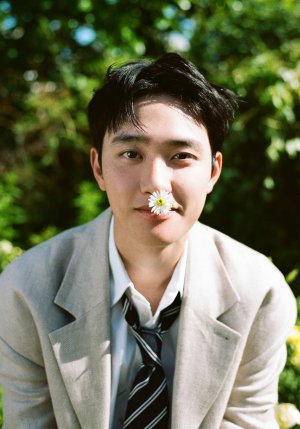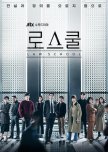
Deze recentie kan spoilers bevatten
Toying with Law Can Be Exhilarating
One of the most exciting things of a drama sub-genre is the ability for common viewers to learn a topic specifically via entertainment media. Law School is an epitome of that when it comes to legal drama sub-genre. Not only the series being set in a learning environment of masters degree but it also incorporates the academic community facing real-life-like problems, in extreme measures. While some events occur *too* coincidental from one to another, the insertion of law generates a decent a visualization for viewers without particular law backgrounds (like me).Law School has successfully executed an eagerly complex law-heavy plot. While the first few episodes might bring viewers into confusion due to rapid and excessive delivery of law articles, the later episodes appear to be more relaxed. Seo Byungju’s death is the obvious main topic of this drama. However, the writers did not disappoint in bringing up his past thus creating subplots that neither interfere nor being too far off from the main case. A bit of detour happened with Yeseul’s trial but it breathed a new air to the drama once the main plot started to stall. Although Law School keep its plot focus on legal/courtroom and not romance-related, some subplots felt like they were left hanging. Yoo Seungjae’s case started with enticing movements yet they left him off the screen during his whole trial. Seo Jiho’s case was also left with an ending open to interpretation. There might be differences against each other, but there is a unique thing that laps over the other: a strategy of toying with law to set yourself free from the case.
Apart from the favorable plot, Law School likewise offers appealing characters. The overly-rigid Professor Yang might be annoying at times but his clever instinct is one of his redeeming qualities, a terrific portrayal by Kim Myungmin. With most dramas, the writers tend to latch into romance to develop more subplots and characteristics while this is not the problem in Law School. The exclusion of romance did not necessarily means bland interaction among the characters, in fact most of them (especially the study group) appears to be very natural. I personally found Han Joonhwi and his friends (especially Kang Sol-A’s) bond to be entrancing. The supporting characters are generally fine and stayed in their lane.
Furthermore, Law School is backed with decent supporting elements. The sets, cinematography, music pan out to be good but nothing particularly special. The series already had a thrilling plot hence having average supporting elements is already enough to construct the drama to be good in general.
In closing, Law School is a great drama with strong plot and characters and decent supporting elements. In the end, it’s a one way of enjoying entertainment while learning law by watching people toying with it. Although, I would like to end my review with this common saying, “Law school taught me one thing: how to take two situations that are exactly the same and show how they are different.” — Hart Pomerantz
Vond je deze recentie nuttig?
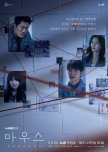
Deze recentie kan spoilers bevatten
Is it psychopath or the idea of psychopath that’s more haunting?
Blending barriers between the world of sci-fi and the realm of thrilling and gore-y realm, Mouse surfaces as somewhat a unique and intriguing Kdrama. As wild as it gets, the fantasy side of Mouse seems unrealistic by the books. Brain transplant is one of the surgeries that has never succeeded in real medical world. However, this drama excavate the uncertainty of that surgery into such damnable plots on top of wrecked plus wretched characters. In between those many many characters, the spotlight dims onto notable psychopaths (by genetics), which this drama revolves around.Mouse started with a bang. The premise is rationally convincing although it is nowhere near realistic (psychopaths have hereditary genetics). Honestly, the pilot episode alone stood out and could've been a single movie. As the series jumped into the next 5 episodes, we began to learn our characters step-by-step although with murders going on. Things started to shift after Bareum's surgery. We were able to notice change in his behavior and surroundings being far fetched from the first 6 episodes. While his memory was still not fully intact, he's collecting puzzle pieces to be aligned, thus gathering everyone once again to reveal the truth.
As Mouse itself is a heavy plot-driven drama, it became a problem when the plot stuck with no progress. That was my problem during episode 7-13. These middle chunk of the series spread puzzle pieces like easter eggs through the bushes, many of them. Does it sound interesting? Yes. Was it actually interesting? Not so much. The problem is most of those puzzle pieces open new cases rather than adding new informations to the main case. It was all over the place. Well some of them were helpful and/or interesting: Dr. Daniel Lee, Oh Bongyi and Kang Duksoo, Detective Konam and cat tooth — the rest could be retold with a summary: Woo Hyungchul, Lee Jaeshik, and Kim Byungtae. I dragged myself watching those cerebral episodes as they didn’t really came off as entertaining. Thus being said, the middle part could’ve been trimmed and would’ve resulted a more compact 16-episode drama rather than a hefty 20.
The pacing of Mouse started to picked up again on the last third, reciprocating everything from the start. The creators were surprisingly consistent with the over-the-top delivery of the main plot (its backstory, recent past, and present). (Oh, watch Mouse: The Predator after Episode 15 by the way, most scenes are skippable as they were repeated but it gave new perspective). While I love the “main” twist and everything karma wise, something about OZ organization still irks me. The idea of “the bigger forces controlling things” felt cliched and unoriginal. Yet from that, the characters can step in and deliver the message to not spark a fire to the fuel. Psychopaths can be dangerous, but the people triggering them and protecting their crimes are worse.
Despite the consistency that Mouse centered on the seven deadly sins murder, the show had some subplots that were all tied yet felt dragged to be added. There might not be a room for romance here yet there were baits that can be seen as a filler within the main characters. Cho Hongju’s family plot felt not so remarkable as they dropped the premise and was remain untied until the very end. Some other psychopaths (as were mentioned before) felt like a filler. And The OZ, welp. Another thing, I found it a little strange that all of the psychopaths are male as the show did not explain in advance that the gene was only inheritable towards male individuals.
Now let’s talk about the characters, especially the main four. As this drama centered on Jung Bareum (Lee Seunggi), his arc was nearly terrific. The character development could not have been any better in this sci-fi thriller drama, and it would not have been delivered perfectly without his standout acting. (You can clearly sense his outstanding performance in Mouse: The Predator). Go Muchi (Lee Heejoon) is another amazing character. The tough main detective may have malicious intentions in the name of justice, but deep inside he was just a kind-hearted man. Contrary to the men, the female characters were not as spectacular. Most of the time, Choi Hongju (Kyung Soojin) and Oh Bongyi (Park Juhyun) only helped at certain parts of the drama and felt like a nuisance at other times. Nonetheless, the actresses delivered great performances.
Some supporting elements of the drama were accommodative but not so extraordinary. Most of the scenes happened in the dark (well, it’s a thriller one). I genuinely don’t have a problem with that but some times the shots couldn’t be seen clearly, especially during rainy dark scenes. The music is generally alluring and in line with the plot. They are thrilling but not to the point it was too scary like those horror jump-scare movies. Additionally, I genuinely appreciate the team to not harm any animals within the series and use CGIs that did not came off as tacky at all.
One thing that I would like to point out from Mouse is the ability for viewers to empathize with the psychopath. The writer did a great job in adding layers to pity “a mere” psychopath due to the suppressions that were put against them. Analogical to the real life, everything threatening can be reviewed. Is it really threatening or the idea of it is threatening. In the end, humans tend to go with the flow. Ironically, barked the wrong tree without knowing the real truth.
Vond je deze recentie nuttig?

Deze recentie kan spoilers bevatten
Trauma Cleaners — their job, life, and trauma
Had anyone asked me a few weeks ago, before I started watching Move to Heaven, I wouldn’t be so aware on the life of trauma cleaners. Regardless whether it’s a drama or real life, trauma cleaners must endure creepy scenes over a pressuring environment. Constantly moving their car to not be seen, closing the shades while working, are two of many other environment’s pressuring requests. Additionally, it is obligatory for the trauma cleaners (at least in this series) to “deliver” messages from the deceased and their loved stuffs handed in special yellow box. Move To Heaven also allows viewers to have a glance on the life of our hero whom has an Asperger Syndrome and recently-deceased only parent. Hold on, that’s a lot already. Are we in for a journey with worthwhile tears? Honestly, this is more than that. As compelling as it sounds, the series continuously steers our emotions on every single episode, making no room for boredom.Move to Heaven is absolutely one of a kind drama. The peculiar premise lived up to its expectations as it consistently delivered meaningful slice of life-like narrative. The plot in general is well-connected to each other although some might need reminders to subtle details (like the female detective at the last episode). The dynamics have a good portion of everything. They didn’t make it depressing, or too funny, or too angsty. Everything is well-balanced to one another.
The trauma cleaning subplots (the deceased stories) were crafted in poking criticisms of the society coated with heart-wrenching stories. People did not realize how precious their loved ones actually is until those valued memories of them transformed into regrets. Distinctive arguments shape-shifted into glitched unrepairable tape constantly repeating on the living’s head. This series helped us learn to respectfully love people as who they are—whether they may be bothersome, having different perspectives, or in a contrasting social class.
Onto our main characters, I would like to applaud the writers once again for conveying Han Geuru (and his surrounding)’s stories with countless heartwarming aspects. As we have already known, Han Geuru had been living a struggling life after his father’s passing, only for his past to be way more harsh than we could have ever imagined. However, Geuru wasn’t really perceptive in terms of emotions, making him a strong individual that kept moving forward. Geuru mostly carried the trauma cleaning service with his extra attention to details. His extremely-observant nature pushed Move to Heaven into having detective-like journey. Throughout the series, the 20 year-old boy had a fantastic character arc (emphasis on letting Father go). Shoutout to Tang Junsang for portraying Han Geuru effortlessly.
Cho Sanggu had lived a contrasting life. Although his contrasting attitude may be seen as bothersome, his character development is perfect by growing fondly of Geuru (really love their chemistry). Sanggu also has a deep trauma that made him held grudges in the past. Not only about his paternal brother but also his “hoobae” in boxing. Eventually, this series helped him overcame those with strings of occasional events (hint: Amusement Park and Train Station). Parts of Sanggu’s stories might have appeared on another series yet it comes handy overall. The supporting characters did not really have strong plots or arcs but they were supporting for a reason. My only criticism would be the lack of Namu’s family stories (and her past) as viewers never get to see what happened inside her house. On the other hand, Namu’s character balanced the main two perfectly.
As Move To Heaven is an original Netflix series, I always found them to be different with cable or free-to-air dramas. Move To Heaven doesn’t necessarily felt like “another” kdrama at all, it stands out. I am personally a frequent Kdrama viewer (on top of a Kpop fan) and always subtly annoyed with the same sets being used in multiple series, but this is not the case here. Move to Heaven explores many locations that I never or barely saw on other Kdramas. Notably, they also use a different approach when it comes to cinematography. Furthermore, the VFX team did an outstanding job especially in visualizing Geuru’s attention to details. I always love every moments when all those stuffs in the yellow box flew above Geuru’s head, aligned, with him trying to crack a code. Every episode has a decent length between 40-60 minutes and far from being formulaic (a problem that usually occurs in “another” kdrama). Move To Heaven’s production team really paid attention to details and it paid off. Other than one thing, there’s no such accommodating or memorable OST here.
On a final note, Move to Heaven is a new magnum opus within the new series being released. Everything about this drama is perfectly well-balanced of each other—whether it be the plot, characters, or supporting elements in general. All being well for Season 2 to be picked up soon (in the same or better quality cause we don't want a mess like the other Netflix original series *coughs* Love Alarm *coughs*). We need more episodes as 10 of it is certainly too short!
Vond je deze recentie nuttig?

Deze recentie kan spoilers bevatten
Criticizing Hazing Phenomenon
“Every masculine gender of the Republic of Korea shall faithfully perform mandatory military service, as prescribed by the Constitution of the Republic of Korea and this Act.” Those exact words taken from the "Military Service Act" Article 3 were shown at the beginning of every single episode of D.P. Derived from the law mentioned, every single man in South Korea are obligated to perform a mandatory military service (with exceptions) for an estimated 2 years in length. The law has been globally infamous along with the surge of Hallyu wave throughout the world. However, have non South Korean people ever think about the meticulous events happened during the service? Although D.P. is pretty much fictional, the series allowed viewers to have a glimpse of life that was rather under publicized during the service.Within the span of only 6 episodes running from 45-55 minutes each, D.P. was mainly carried by the main duo: Ahn Junho and Han Hoyeol. Both of them showed an alluring bond despite their quite far off characters on each other. Junho was always portrayed as the serious, observant, and strategic one while Hoyeol topped him off by the goofy, open, and playful persona. Though with this short time span, the series doesn’t offer much characters yet some still left remarkable points: Sergeant Park’s upright nature, Captain Im’s comic persona, some harsh military seniors, and some struggling military juniors. However, the silver lining in D.P. was not coated in its characters. It was the plot that needed to be taken more earnestly.
Set in 2014, D.P. focused on deserted soldiers and the clues that might be left behind in order to brought them back. A detective-like mission has always been a point of interest in many types of series. Nevertheless, the Netflix series distinguishes itself among other kdramas due to its rattling back stories, centered in bullying/hierarchy system in the military. By deploying strong foregrounds, D.P. criticizes not only the South Korean military but also army in general. As a matter of fact, the ingrained seniority has always been an issue in any country’s military forces. Although, such matters never seen much light of day as they were continuously debunked in order to protect the country’s military reputation.
The bullying-centered stories may be vicariously triggering to the viewers as they depict rigorous stories realistically. Actually, the root of the problems are all based on the diverse humane characteristics. However, not everyone can tolerate them especially when it comes to an unaccommodating environment like the military. A loud sleeper, a geek by nature, or just being considered plainly new are some of the intolerable “red flags” according to D.P. Thus, making all of the victims getting consequences—being mentally or physically abused. The bullying took its toll, leading to pivotal character shifts (fleeing, going insane, and even led to suicidal). Though I would like to point out that in D.P., the act did not completely take its toll through physical abuse—compared to the real hazing death victims reported through several news outlet back through 2011-2017. The seniority/hierarchy system in D.P. did not just stop among the private/corporal/lower tier of the military but also the higher ups. The series convey an ironic decision-making situation toward the end that dispatched a disheartening message.
Departing from the daunting stories, D.P. also manages to offer a more humane foreground throughout the series. The episode “Monty Hall Problem” was cleverly written with a probabilistic/mathematics-related premise delivered with real-life implementation. Not only it provided a slight change of pace throughout the series, but also provided a new perspective on fleeing the military. On the other hand, it is also a human behavior to be irresponsible and just simply miss the feeling of being “liberated” — depicted on “That Woman” episode.
Altogether, human acted out on any aspects in life due to the consequences that are currently happening around them, including the men during conscriptions. It is undeniably true that hazing is still happening throughout the military community and beyond. Nevertheless, D.P. critiqued the phenomenon in a compact, cinematic, and epic path.
Vond je deze recentie nuttig?

Deze recentie kan spoilers bevatten
Powerful Women Behind the Ambiguity of Internet
Search WWW has a remarkable, contemporary premise that is appealing to me, personally. The show focuses in three spectacular women whom works in search engine company. While the story starts with such a huge buzz and some political flavor added, the whole show itself is rather more laid-back in general, including fairly static romance plot(s).As the story focuses on the three women and their lives, the thing that keeps me invested in this drama is the dynamic in Barro and the problems they are facing. There is something quite endearing in the TF team. Whether it's the contrast characteristics of Tammy and Scarlett (with their growing chemistry), the four other hardworking teammate, or Brian (and the company)'s relaxed attitude, the series did a great job on building Barro. On the contrary, Unicorn (Song Gagyeong)'s life is more dull in comparison. Perhaps the writer is trying to deliver on how boring it is living a desk-job life in a static environment. Regarding the internet (which is the core of this drama), the writers did a great job explaining internet environment in Korea and raising awareness when we're using it. The political plot-line was great (and complicated) at the beginning but it's fading as more episode goes by. Song Gagyeong's mother-in-law story is pretty much expected and come off as annoying at times. The turn point is anti-climatic and we didn't really get a closure on the aftermath, just a win/losing situation. In addition, this drama has quite much enjoyable jokes.
Departing from the office life, Search:WWW also explores the romance life of these three women. Song Gagyeong and her husband has no chemistry at all until the middle (well, it's the purpose of marriage-of-convenience, I guess), their romance basically offers nothing to me. Tammy and Park Morgan made a nice couple. At first I thought they might suffer just because of their decade age gap, but they suffer much more from their values. While they made a good couple, I don't necessarily enjoy them towards the end. There's just not much spark coming out of them as a couple and they rather made me feel like they are just "another" couple of a kdrama. Scarlett and Jihwan's romance is definitely the most interesting one. Everything from their first encounter, buildup, until the end of the drama is so good. I really love the lost & found scene as it not only refers to a thing one of them is missing but it also interprets to how they are lost and they found each other in that room. Arguably my favorite scene.
Moving on from the story, the elements supporting this drama are all great. Starting off from the acting, they all embody their characters perfectly. Neither of them is overdoing or half-assing their acting, it's great. I personally love Scarlett's personality, there's something about her that spices up this drama. There's one downside in the acting though, I don't like the mother-in-law much, she isn't really suitable for that role. The music in this drama is generally great. They caliber the vast and vibrant life of this modern age especially on the ever-growing era of the internet, it's contemporary. Regarding the sets, they choose great locations to shoot although I do have a problem with that one café everyone is using. I'm not sure how Morgan, Tammy, Scarlett always uses the same café for doing business, meeting the online streamer, or others when they live quite much far apart (as proven by the necessity to drive to each other's houses/office). It irks me a bit as they never really explained it as Barro/Unicorn employees regular cafe or something. Cinematography in general is pretty nice. The cameras used, lenses, and filters are pretty good. I love the close-ups scenes especially the tilted ones. For the wider locations, they made the scenes look more cramped at times (well this is just my opinion).
In the end, Search WWW offers a realistic peek on the life of a 30-something successful and powerful women along with their hardships. I wouldn't say it's a slice-of-life or goal-oriented drama but it's a mix in between. One thing that I knew, it tells the story of powerful women behind the ambiguity of the internet.
Vond je deze recentie nuttig?
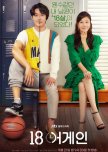
Deze recentie kan spoilers bevatten
Valuable life lessons might not come in the best form
'Regretful youth' seems to be the strong premise behind "18 Again". The drama, which is adapted from the infamous American Movie "17 Again", is a lightly-plotted one filled with struggles, family warmth, worthwhile life lessons, and a bunch of jokes (that came off as either purely funny or, most of the time, being more cringe-worthy). Starting off, it must have been a brain-digging ideas to adapt a 2-hour movie into 16 one hour-long episodes. That's almost tenfold of its length. As a consequence, while giving direct moral lessons, a big chunk of the middle part came off as being filler stories, specifically subplots.A bit of the plot: The journey follows a regretful 37 year-old Hong Daeyoung (who was about to divorce his wife Jung Dajeong) instantly turning into his 18 year-old self out of the blue. While he's at it, he attended his twin children's school. Other than the school's dynamics, the series also follows Dajeong's journey on becoming an aspiring announcer, a dream she put off while being pregnant with the twins at 18.
First of all, I didn't watch the original movie prior to watching 18 Again as I wanted to learn things thoroughly and not comparing to 17 again. However, things took a whole detour after the first few early episodes and only get back up after the two-thirds of the drama. Yes, it has too many subplots. I claim that the main plots are: Daeyoung as Uyeong, Dajeong's work life, and the twins school life. They were pretty much well-written and relatable although most of the times one of them outshines the others in an unbalance way. Things like Sia and Siu lying to their parents about school life could not be more realistic. The story telling is thorough but they might bring the viewers to gain some subjectivity other than making the viewers having more objective view. However, the gap between those subjectivity might help viewers realize on valuable things that humans have ever regretted before. Some simple things they wished they had done, even as simple as being a good son to their parents.
For the subplots, I found Ye Jihun's family plot to be heartwarming while being too coincidental had it happened in a more realistic approach. Seo Jiho's is an interesting character but it felt like he's gone in the middle for some reason. The geeky-adventure of Deokjin and Ms. Ok is lightly funny but adds nothing to the drama's whole weight. The elevator scandal is good. For the others, I found a lot of them to be unnecessary: Choi Ilgwon's whole story of admission scam and problems, the two random employees in Deokjin's company, Aerin's hateful friend, Si-u's barely-appearing girlfriend, and for the worst: the random stalker. I found the stalker plot to be underwhelmingly executed as they had been teasing it since the very early stages of the drama. The reveal was misleading too plus it adds nothing to the drama. Another thing about the story/writing, I found the tear-jerker scenes to be beautiful (although I'm a hard person to cry), especially Sia's bank scene, 2002 World Cup, and Siu meeting dad. In contrast for the lighter comedic scenes, I found most of the jokes to brings me second-hand embarrassments especially when it comes to Ko Uyeong acting as a dad/wife/friend in an 18 year old form. Some people might find the jokes funny, but those are not for me.
For the characters, they seem to be as what they are designated to be except the ones I have mentioned above. The main characters are amazing and their acting are top notch, especially Lee Dohyun for embodying a middle-aged man. At times, Dajeong might seem too angelic but (i'm not sure why) her character just seem so humane. Also love the twins. I found Jiho's character to be interesting and easy to relate to but most times he isn't present in the drama. Jaseong's character development came off as too instant at times that I was shocked one or two times of him showing a more friendly side. Dajeong's seniors and colleague Yumi's character development also seem a bit too delayed at the end. For the others, I might just say they are what they are shown, with the complaints from the plot still stands.
Other additional elements to the drama actually added some value to the drama. The music might be too repetitive with that one soundtrack but it served its purpose. There's not many special effects but they are necessary and didn't devalue the drama. The settings of places and timing are greatly consistent.
Overall, 18 Again is a nice ride of emotions with great acting, decent storyline, not-for-everyone jokes, and valuable life lessons. However, as just how life goes, those valuable life lessons might not come in the best form.
Vond je deze recentie nuttig?

Deze recentie kan spoilers bevatten
It’s realistically true, Nevertheless
Love has always been a complex topic which draws a great amount of interest in every audio visual art form. It is also the case with Nevertheless. The story revolves around multiple youthful, free-spirited, reckless love from diverse characters in a homogeneous college environment. The kdrama itself came in a short, seemingly compact 10 episodes which aired weekly (a short 6 episodes and held a difference from the usual 2 episodes per week usual Kdrama formats). Although with the unique format, the love adventure is not as solid as they making it out to be.Disclaimer: Nevertheless is based on a webtoon from the same name, however I never read nor had any interest on the said e-comics. This review is based on my personal preferences.
Nevertheless tells the story of multiple Sculpture major students — emphasis on love stories — but it mostly focuses on a senior student, Yoo Nabi, and her junior yet-the-same-age-and-a-player, Park Jae-eon. Other than our main couple and the dynamics of Nabi’s friends, we also learn about an additional main character Yang Dohyeok which happens to be Nabi’s long-lost childhood friend (whom had a crush on her).
The premise of Nevertheless offers simplicity. Within all the relationships, every one of them has their own unique up and downs. Firstly though, let’s focus on Yoo Nabi and Park Jae-eon. The main couple of the story speaks to the audience as they were relatable to recent dating trends. Either you hate commitment, disbelieve in fate and coincidences, vent some sort of lust, or unconfidently stand on your own two feet of principles, they offer a realistic approach to all of those. While being realistically enchanting, the plot execution of Nevertheless fell flat especially towards the end. The early stages of Nabi and Jae-eon’s relationship felt nerve-wrecking. However, other than feeling anxiously excited for each other’s next moves, it comes off as jitty — thanks to Jae-eon’s over-the-top red flags in almost every love-related scenes. We also got a too-kind hopeless romantic second-lead — that the female lead seemed to be more comfortable with yet didn’t end up with. Out of many possible outcomes, if anything, Nabi could’ve been a miss independent in order to obtain her dreams and a stable life. Yet, she ends up with Jae-eon declaring her willingness to regret the relationship if necessary. Nabi’s plot is indeed, dryer than I thought it would be, except for that one time her piece being broken.
Fortunately though, Nevertheless showed redeeming qualities when it comes to the side couples. Although I would point out firstly how it felt a little too exaggerated that every single pairing is on a timid and homogeneous environment, a Sculpture Major in a university. Starting off with Oh Bitna (the Gretchen Wieners of the university) and Nam Gyuhyun (a decent guy, though he seems to do mansplaining to Bitna quite often) whom had the best friends turned lover trope. Being a side plot, their arcs didn’t do much but the simplicity revolving around them was enjoyable. A major downside when they edited the guy out of the frame on episode 8 and 9 due to his personal life scandal. Being best friends since childhood, the cute yet possessive Seo Jiwan plus settled and though Yoon Sol is another story. In the act of South Korea becoming slightly more progressive, the addition of this LGBTQ+ couple actually felt enticing as the characters didn’t overdo neither half-assing their actions. Last but not the least are the double decent seniors, Ahn Kyungjoon and Minyoung. I never really understood their presence in the university, lack of details there, yet this couple felt effortless and natural. Sadly, the duo didn’t really connect with the main plot and felt more like a filler. I might missed some couples but those four are the necessary ones. Aside from the characters mentioned earlier, the extended characters that were not affiliated with the main couples are lively — especially the bubbly assistant and Seo Jiwan and Yoon Sol’s witty male friend.
Other than the love stories, I found Nevertheless to be lacking in plot with the corresponding settings that it had. The drama clearly had potential with exploring the life of university, specifically art department, multiple students which basically means multiple personalities and lives, yet they didn’t explore those much. The writers should have given opportunity for the viewers to learn about sculptures and art rather than leaving the topic as a bypassing. A few times Nabi and other students had to present their projects or art related materials but those were left unseen. The background stories of everyone except Nabi were not explored at all: their families, earlier education or experiences, etc. Moving on, some gatherings or group hangouts being offered, although the act of group talks while eating felt too repetitive throughout the series. Though with the negative points I had mentioned, the glimpse of university life depicts a proper life without pandemic very well.
As I have had mentioned by the show having a great potential, it truly did when it comes to the supporting elements. The OST is terrific, definitely one of the best among this year’s Kdramas. All of songs are notably easy-listening while adding flavor to the stories (special mention to Sam Kim’s Love Me Like That, Kimmuseum’s We’re Already, and J.UNA’s Butterfly). Another excellent point is the cinematography. Every single shot expresses the situation, expressions, and additional meanings of the characters’ actions immensely. Although I found many vents on social media regarding Song Kang being lacking in acting or other stuffs, the portrait shots are excellent. Another thing I would like to point out are the sets that felt natural whether it comes to the studio, the hostel when the students went to another city, or many others.
The story of Park Jae-eon and Yoo Nabi might have left mixed impressions among the viewers. However, the whole journey was quite enjoyable. I watched Nevertheless mostly as a side drama and just once a week while watching other series that were “darker”. So this one was a nice fresh breath of air. Perhaps, one of the reasons I quite enjoy this drama was because I never really take things as seriously and overly passionate as heavier series. This drama can be classified as just *another* kdrama with the final result, nevertheless it had a cute run.
Vond je deze recentie nuttig?
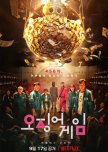
Deze recentie kan spoilers bevatten
The Extreme Measures for Money
Whether you live in a capitalistic environment or not, the universal term money is globally acknowledged as a main trade item for any kind of purchase. The interchangeable item is powerful enough to let anyone gain ownership of any item from miniscule stuffs to gigantic objects. With human’s eagerness of ownership, people could take extreme measures to reach their goals including being massively in debt thanks to their countless loans. Logically, for the boundless pledgees those loans can be hardly repaid. However, by stepping out of reality, if they were offered to earn an insanely huge amount of cash by playing several rounds of childhood games, perhaps they would like to give it a shot.Welcome to Squid Game, players are welcomed to play six rounds of folk games in a span of six days. The winner is granted cash prize worth 45.6 billion won. Players are recruited unbeknownst of themselves by an anonymous company (that has a circle, triangle, and rectangle logo) at their lowest moments (in terms of debts). But at what cost? No one told them initially until it was revealed that losers of each rounds will be eliminated by literally being shot to death.
Squid Game has 456 players and many other extras. The show centers around Seong Gihun, a divorced man without proper occupation nor custody of his 10 year-old daughter. Additionally, Gihun has a high attraction for bettings. The ironic life Gihun was living depicted a harsh condition that perhaps a lot of people has ever experienced. Despite that, his humanity nature is delightful and brought a realistic touch to the character. His clever and notorious best friend, Cho Sangwoo, also happened to be in the game due to his business activities. From the short narrative alone, it is hardly surprising that Sangwoo turns out to be a sly, opportunistic, and egoist individual. Both characters are executed immensely by the actors.
On the other side, the supporting characters added dynamics within the players and the story in general. Kang Saebyeok, a North Korean defector with cold-yet-alluring persona was excellently performed by Jung Hoyeon (an impressive acting debut). The manipulative Han Minyeo, trustful Ali, thug-like Duseok, and the old man are some of other characters that made Squid Game interesting. Another important character, Hwang Junho, instantly became viewer’s favorite due to his fearless personality. Several other players noticeably added more fascinating elements to the drama.
Onto the story, Squid Game delivered a relatively slow yet thorough buildup from Gihun’s back story, player recruitment process, until the game itself. Some people might not enjoy the slower approach but I do think it gives the viewers a better idea in understanding the game, character’s emotion, and situations in which they were facing. Even though we must note that the main games are brought with rather sudden, thrilling, and sadistic approach. Within the tight span of 9 episodes, the 6 games and plots are generally distributed properly that it could raise many questions by the end of each episodes, leading to a binge-watching experience. Another point worth mentioning is Junho’s subplot. Although his character can be considered as an outlier, his infiltration to the game as a worker provided a nice different point of view of the game’s system in general.
While I do enjoy most of Squid Game, the series couldn’t hold its thrilling journey for the whole 9 episodes. It sort of wore off after the fifth game. Personally, I do think Squid Game was mostly carried by the dynamics and interactions of each characters. As soon as they kill the important roles, the excitement of this series began to let loose. Each episodes automatically have more gaps to be filled in. With a mountain-like structure, the Kdrama reached its climax on the sixth episode (fourth game) as it jumbled a mixture of vulnerability and moral dilemma that generated an emotional chaos for the viewers.
Another standout point of Squid Game is the fine extra attention to the details. Almost every single frame/scenes have its own symbolism or implicit messages. There are many moments worth mentioning but foremost it was in the dynamics of the players. During the team selection processes, the players depict several examples of discriminations—that can be generalized to communities across the globe. Whether it be racism to those who doesn’t look like a majority (in this case Ali for not looking like a Korean), sexism to women for being labeled as weak, or ageism (which only happened to the old man). Additionally, the VIPs being mostly old white man is a nice touch as to the picture of being colonized by white people or even their arguably terrible-yet-great acting in thinking they own “the world”.
The details didn’t stop there. Some people may or may not have noticed but the Squid Game creators actually dropped some hints ever since the very beginning of the drama (hence why I wasn’t really shocked for the twists). Gihun had been inescapably affiliated to the number 456: from his player number, until the amount of money he won from the horse betting (4.56 million won). He also gave his daughter a gun-shaped lighter as a present present inside a black box tied with pink ribbon—pretty similar to the “coffins” in the game. The old man was suspicious for numerous times including being excited on the first game, able to stop the night fight, and not wanting to switch shapes during the second game with Gihun—but he wrapped it perfectly with the dementia excuse.
The excessive details are honestly compelling yet some of them fell short and was left unfinished. Saebyeok climing arc was an interesting take with the screw not being attached properly. However, they just left her action the way it was—a wasted subplot there. Some questions were also left unanswered such as: how the workers get there, why Junho’s brother played such an important role and can remain MIA for over 5 years, The VIPs back stories, Junho and the police whereabouts. While those questions might bait the existence of a second season, I honestly pointed those out as Squid Game felt finished in general and it didn’t really have the necessity to continue especially if they are going to keep it centered around Gihun. Instead, if they decided to resume, it would be better to switch it into a spinoff about the workers.
A further point that made Squid Game distinguishable and attractive is the production. Having childhood games as the main theme, the series brought such sadistic and thrilling stories wrapped in colorful sets. The ironic contrast definitely left an eye-catching impression for all the viewers and even those who have only seen the short clips circulating on the internet. The consistency of the costumes also marked a strong point for Squid Game. Though the red jumpsuits of the workers might be similar to the ones in Spanish TV show Money Heist, the other styling still felt original and has its points of being iconic (that perhaps could be recited sometime in the future).
The viral sensation Korean Netflix Series, Squid Game, has an enormous amount of points to be remarkably acclaimed in the contemporary TV Shows landscape. Although, I must admit that the show wasn’t a completely perfect journey. Regardless of the decision whether the creator of Squid Game would like to continue onto the next seasons, the standalone 9 episodes (so far) are worthy to be the talk of the public.
Vond je deze recentie nuttig?

